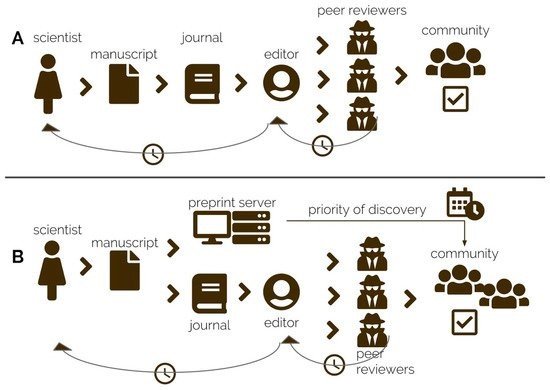(Image CC BY from Jonathan P. Tennant, et. al. “Ten Hot Topics around Scholarly Publishing” Publications 2019, 7(2), 34; https://doi.org/10.3390/publications7020034 )
In academic publishing, a preprint is a version of a research paper that precedes formal peer review and publication in scholarly journal.
Preprint can be publisher- or community-led and a range of discipline-specific or cross-domain platforms now exist.
So what are the benefits of ‘preprints’?
- Preprints provide a time-stamp at time of publication, which establishes the “priority of discovery” for the paper. Thus, a preprint can act as proof of provenance for research ideas, data, models, and results.
The fact that the majority of preprints come with a permanent identifier, usually a Digital Object Identifier (DOI), makes them easy to track.
The DOI also makes them easy to cite, and articles published as preprints tend to accumulate more citations at a faster rate.
- In addition, according to Tennant et al. (2019) preprints protect against ‘scooping’:
“In a traditional publishing scenario, the time from manuscript submission to acceptance and to final publication can range from a few weeks to years, and go through several rounds of revision and resubmission before final publication. During this time, the same work will have been extensively discussed with external collaborators, presented at conferences, and been read by editors and reviewers in related areas of research.
Yet, there is no official open record of that process (e.g., peer reviewers are normally anonymous, reports remain largely unpublished), and if an identical or very similar paper were to be published while the original was still under review, it would be impossible to establish provenance.”
Indeed, there are multiple benefits of preprints, especially for early-career researchers: rapid sharing of academic research, open access without author-facing charges, establishing priority of discoveries, receiving wider feedback in parallel with or before peer review, and facilitating wider collaborations.
*As a few publisher do not allow the sharing of preprints, be sure to check that this is not the case with yours.*
